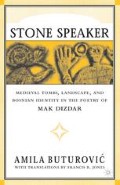Abstract
Awillingness to create and destroy, to sacrifice and dispossess, to give up and take away life, all in the name of “belonging,” imderpins the politics and poetics of nationalism. Wherever we turn, the construction of nationhood proves to be a Performance of ardent aspirations and acts. In 1992, Bosnia-Herzegovina entered the world stage as a site of the most ab- ject kinds of national assertion witnessed in Europe since World War II: genocide, destruction, forced migration, concentration camps, and sys- tematic rape. “Ancient ethnic hatreds” became the most populär trope in the discourse surrounding the Bosnian war. By the end of the war in 1995, thousands of people had been killed, many more displaced, and most of their material possessions confiscated or turned to rubble. Even as I write, nearly six years after the Dayton agreement, the Situation in Bosnia- Herzegovina remains volatile. Although the Dayton, thankfully, secured peace on the g round, it für the r destabilized any sense of national unity as it dissociated many people from their prewar resources and living envi- ronments. Sadly, then, national partition, rooted in religious differences and manifested in an array of Symbols and actions, is a distinct reality of Dayton. The boundaries among the three groups are highlighted as each group—Muslims/Bosniacs, Serbs, and Croats—increasingly cling to their particularist pleas, memories, and interpretations of the immediate and distant past.
Access this chapter
Tax calculation will be finalised at checkout
Purchases are for personal use only
Preview
Unable to display preview. Download preview PDF.
Notes
Zvonko Kovac, “Od komparatistike tekstova do interkulturne povijesti knjizevnosti,” Godisnjak institutaza knjizevnost (Sarajevo) 20 (1991): 66.
Stuart Murray, Not onAny Map: Essays on Postcoloniality and Cultural Nationalism (Exeter: University of Exeter Press, 1997), 13.
Adrian Hastings, The Construction of Nationhood: Ethnicity, Religion, and Nationalism (Cambridge: Cambridge University Press, 1997), 130.
Enes Durakovic, Antologija bosnjacke poezije XX vijeka (Sarajevo: Alef, 1995), 22.
Benedict Anderson, imagined Communities (London: Verso, 1991).
Andrew B. Wachtel, Making a Nation, Breaking a Nation (Stanford: Stanford University Press, 1998), 4–5.
Copyright information
© 2002 Amila Buturović
About this chapter
Cite this chapter
Buturović, A. (2002). Introduction. In: Stone Speaker. Palgrave Macmillan, New York. https://doi.org/10.1057/9780312299156_1
Download citation
DOI: https://doi.org/10.1057/9780312299156_1
Publisher Name: Palgrave Macmillan, New York
Print ISBN: 978-1-349-38697-0
Online ISBN: 978-0-312-29915-6
eBook Packages: Palgrave Literature & Performing Arts CollectionLiterature, Cultural and Media Studies (R0)

